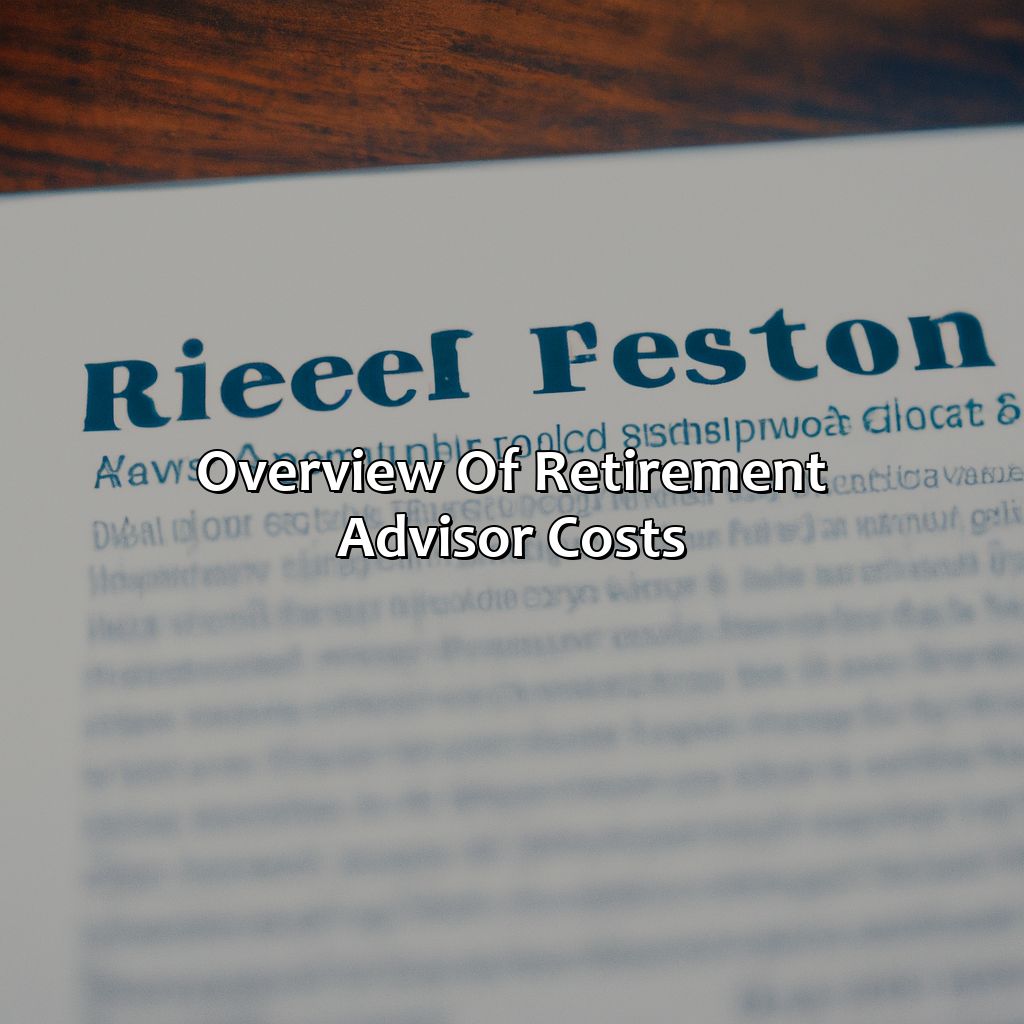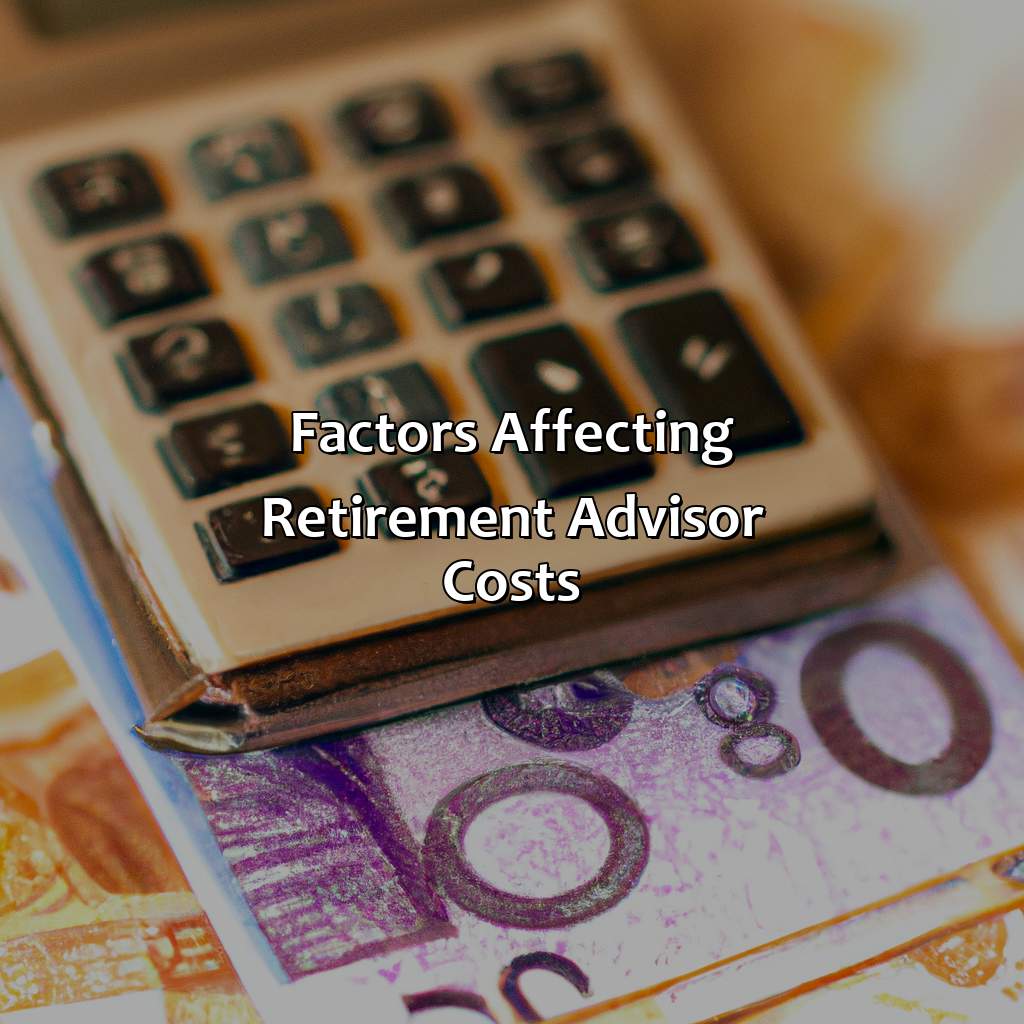How Much Does A Retirement Advisor Cost?
Key Takeaway:
- Retirement advisor costs vary depending on several factors including experience, credentials, and the type of retirement plan or investment. Payment structures such as hourly rates, AUM fees, and flat fees also impact costs.
- Advisor experience and credentials play a significant role in the cost of retirement advisors. Those with more certifications and experience tend to charge higher rates.
- AUM fees, or Assets Under Management fees, are based on a percentage of the total assets being managed and can vary greatly depending on the advisor and the type of investments being managed. It is important to understand how AUM fees work and compare with other payment structures.
Feeling overwhelmed by retirement planning? You’re not alone. A retirement advisor can help you take control and make informed decisions about your future. Discover the cost of hiring a retirement advisor and make an informed choice.
Overview of Retirement Advisor Costs
Retirement advisors can help you plan for retirement by offering investment advice, creating financial plans, and managing your assets. The cost of retirement advisor services varies depending on the type of service provided, the advisor’s experience, and the complexity of your financial situation. Retirement advisor fees can be charged hourly, as a percentage of assets under management, or as a flat fee. It is essential to understand the fee structure and any potential additional fees, such as trading and transaction costs. Advisors with a fiduciary duty prioritize their clients’ interests and charge reasonable fees.
Pro Tip: When selecting a retirement advisor, consider their experience, qualifications, and fees to ensure a good fit for your financial goals.

Image credits: retiregenz.com by Yuval Washington
Factors Affecting Retirement Advisor Costs
Retirement advisor costs are determined by a number of factors. First and foremost is the level of expertise of the advisor, as well as their experience in the retirement planning field. Another factor is the location of the advisor, as advisors in larger cities typically charge more than those in rural areas. The complexity of the retirement plan also plays a role, as more complex plans require more time and resources to design. In addition, the type of services required by the client, such as investment management or estate planning, can impact the cost.
Furthermore, the reputation of the advisory firm can also impact the cost, with more established and reputable firms charging higher fees. It’s important for clients to carefully review the services being offered and the associated costs to ensure they are getting the best value for their money.
It’s also worth noting that some retirement advisors may offer alternative fee structures, such as hourly rates or flat fees, which can be more affordable for clients. Clients should discuss these options with their advisor to determine what makes the most sense for their unique situation.
In summary, retirement advisor costs are determined by a number of factors, including the advisor’s expertise and experience, location, complexity of the plan, type of services required, and reputation of the advisory firm. Clients should carefully review the services being offered and the associated costs to ensure they are receiving the best value for their money.

Image credits: retiregenz.com by Joel Washington
Average Retirement Advisor Costs
Retirement Advisor Costs: A Professional Breakdown
Retirement planning is a critical life decision that requires expert guidance. A retirement advisor can assist one in determining the best financial strategies and products to achieve a comfortable retirement. However, a crucial aspect of retirement advice is knowing the cost.
Retirement advisor fees can vary depending on a range of factors such as experience, location, and level of service required. The fees typically fall within a range of 0.5% to 2% of the client’s assets under management. For instance, if a client’s retirement portfolio is worth $500,000, and the advisor’s fees are 1%, the annual fee would be $5,000.
It is worth noting that some retirement advisors charge a flat fee rather than a percentage of assets under management. These fees can range from $1,000 to $3,000 for a comprehensive plan or $200 to $300 per hour for hourly consultations.
Moreover, some advisors charge additional fees for specific services, such as tax preparation, creating retirement income strategies, or estate planning. These additional services may come with a fixed fee or charge based on the complexity or time involved.
True Story:
My colleague, James, reached out to me for advice on finding a retirement advisor. He was concerned about the cost and didn’t know whether he could afford it. I explained the different fee structures and advised him to conduct thorough research to find an advisor within his budget. He found an advisor who charged a flat hourly rate and saved him thousands of dollars compared to the percentage-based fees he had been quoted earlier.

Image credits: retiregenz.com by David Woodhock
Finding a Good and Affordable Retirement Advisor
Retirement planning can be overwhelming, but finding a good and affordable retirement advisor can go a long way in ensuring a secure future. It’s essential to choose an advisor who fits both your budget and needs. A knowledgeable advisor can help you navigate social security, pension plans and tax implications smoothly without breaking the bank.
When searching for a retirement advisor, consider the fees and services that they offer. Opting for a fee-only advisor may be more cost-effective than commission-based advisors who charge a percentage of your assets under management. It is also essential to look for an advisor who understands your financial goals and has experience crafting retirement plans for people in your financial situation.
One specific option to consider is robo-advisors. Robo-advisors are digital platforms that offer algorithm-driven investment advice. They tend to charge a lower fee than traditional advisors, making them an affordable option for people who don’t require specialized attention.
Consider working with a financial planner to help you understand the numerous retirement planning options available. They can help you create a customized plan and suggest appropriate investment strategies. Consult with a few advisors to find one that suits your needs.
Don’t wait until it’s too late; start planning your retirement today with professional help. Not doing so may lead to inevitable financial struggles down the line. Find the best retirement advisor suited for your needs and budget to ensure a secure financial future.

Image credits: retiregenz.com by James Jones
Five Facts About Retirement Advisor Costs:
- ✅ Retirement advisor costs can range from $1,000 to $10,000 or more, depending on the advisor’s experience and services offered. (Source: U.S. News & World Report)
- ✅ Some advisors charge a percentage of the assets they manage, typically between 1% and 2%, while others charge a flat fee. (Source: Investopedia)
- ✅ Some advisors offer free consultations, while others charge for an initial meeting or require a minimum investment. (Source: NerdWallet)
- ✅ Working with a retirement advisor can help increase returns and reduce investment risk, potentially saving thousands of dollars in the long run. (Source: SmartAsset)
- ✅ It’s important to research and compare multiple retirement advisors before choosing one to ensure the best fit for your financial goals and budget. (Source: Forbes)
FAQs about How Much Does A Retirement Advisor Cost?
What is the average cost of a retirement advisor?
The average cost of a retirement advisor can vary depending on several factors, including their level of experience, the complexity of your retirement plan, and the services offered. However, the typical cost can range from $100 to $300 per hour or a flat fee of $1000 to $5000 for comprehensive retirement planning.
Are there any hidden fees associated with retirement advisors?
It is essential to ask your retirement advisor if there are any hidden fees or charges not disclosed upfront. Most retirement advisors charge a transparent fee structure, but some may include additional charges like administrative fees, trade commission fees, or third-party fees. Always read the contract or agreement before signing it to avoid any surprise costs.
Is it worth paying for a retirement advisor?
Yes, hiring a retirement advisor can be beneficial both financially and emotionally in the long run. A retirement advisor can help you plan your retirement, optimize your investments, and guide you through difficult financial decisions. They can help ensure you have the funds and resources you need to enjoy a comfortable retirement.
How do I know if a retirement advisor is charging me a fair price?
You can determine if a retirement advisor is charging you a fair price by comparing their fee structure with other advisors in your area. Look for advisors with a transparent fee structure that discloses all costs upfront, avoid advisors who charge a percentage of assets under management, and compare fees with online platforms like Vanguard or Charles Schwab.
Can I negotiate the cost of a retirement advisor?
It is possible to negotiate the cost of a retirement advisor, especially if you are a high-net-worth client or have a complex retirement plan. You can negotiate the fee structure, the duration of the advisory services, or ask for discounts for referring other clients. However, always be respectful and realistic during negotiations.
What services do retirement advisors typically offer?
Retirement advisors typically offer a range of services, including retirement planning, tax planning, investment management, asset allocation, and risk management. They may also help with Social Security planning, pension advice, estate planning, and long-term care planning. The services offered may vary depending on the retirement advisor’s experience and expertise.








